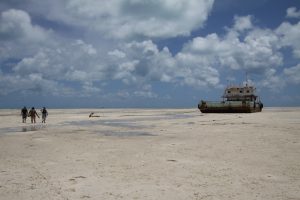Life at the Sharp End of Climate Change

Narev Prepares to Leave Commonwealth Bank
20 August, 2017
Can Finance Save the World’s Vulnerable Nations?
18 September, 2017Euromoney, September 2017
“This is the highest point in Tarawa!” says Tetiria Kireua. “Three metres!”
We are on a scarcely noticeable hump on the country’s only sealed road, right next to the sea: everything is next to the sea here, in every direction, and you could jump into it from this high point with a well-judged leap. But this is as high as it gets on Tarawa, the atoll where the majority of the Pacific island nation of Kiribati’s 115,000 people alive.
Tetiria works for local NGO called KiriCAN, whose missions vary from teaching a doubting and poor local population about the realities of climate change, to planting mangroves to shore up the diminishing beaches, to driving around the occasional inquisitive foreign journalist. She has spent the morning showing Euromoney evidence of last year’s king tide, the worst in memory, which flooded the country’s only maternity hospital knee deep, and left ships stranded high on the beaches next to villages where people live in dwellings raised from chicken wire and bits of corrugated iron, their wells now salty from the inundation of the water table.
Kiribati’s average elevation is just below two metres, among the lowest in the world; that is, for the sake of comparison, an entire nation that is on average the altitude of a single David Hasselhoff. Projections on sea level rises vary but a metre by the end of the century is a common one, and the University of Massachusetts reckons double that. In either scenario Kiribati is gone as a habitable nation.
In truth, though the image of a country disappearing beneath the waves is potent, it’s other things that would do for Kiribati: storm surges from heavily elevated tides and worsening weather, and – the clincher – the inability to extract drinking water anymore combined with worsening droughts, a cruel irony in a place that fights back water all the time. It was with this apocalyptic vision in mind that the country’s previous President, Anote Tong, sanctioned the purchase of a chunk of Fiji for his people to move to if the worst happens. “For us climate change is not an event in the future,” he once said. “It’s an event that we’re dealing with now. Our entire survival is at stake.”
This is the sharp end of climate change. The Pacific Islands, which inevitably now have been saddled with a development acronym (SIDS, for small island developing states, a term that also embraces many Caribbean and other island nations), face particular challenges from climate change. Some, like Kiribati, Tuvalu and the Marshall islands, face a genuine threat of disappearance. Others are imperilled by the warming and acidification of the seas wrecking the coral which protects their coasts and forms a vital part of their fishing ecosystem, and therefore their food supply and their livelihoods. Some, like the Solomon Islands, Vanuatu, Fiji and Tonga, face the fact that cyclones are getting worse: Cyclone Winston, in February 2016, was the strongest ever recorded in the Southern Hemisphere and its hit on Fiji cost the country one fifth of its GDP in a single year, while Cyclone Pam, in 2015, impacted 70% of Vanuatu’s population. Some face droughts, worsening consistently with changing rainfall patterns, and increasing problems with their soil. The whole lot is combined with population growth.
But on top of this, they face a different challenge: they feel like they are too inconsequential to be heard, and even when people are listening, they lack the institutional strength to fit their message and their needs into the sometimes inflexible and always daunting norms of international finance.
“It is often the case that the billions of dollars required to meet the challenges in Asia overwhelm the millions required to meet the challenges of Pacific island countries,” says Mark Brown, Minister of Finance of the Cook Islands. “We fly under the radar.”
*
